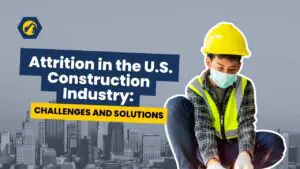The recent presidential election saw Donald Trump defeat Kamala Harris to reclaim the Oval Office. As his administration begins, the heavy civil construction industry is evaluating how Trump’s return might shape infrastructure investment, labor availability, and market trends.
Construction Industry Sentiment Post-Election
Late Q3 2024 polling revealed cautious optimism within the civil construction sector:
- 22% foresee strong growth.
- 34% anticipate moderate growth.
- 32% predict stagnation.
- 12% expect market contraction.
With Trump’s victory and Federal Reserve rate hikes boosting confidence, many are hopeful about new opportunities under his leadership.
Watch: End of Q3 2024 Civil Construction Market Confidence Poll Results
Infrastructure Funding in Focus
During his first term, Donald Trump proposed a $1.5 trillion infrastructure plan but secured only $165 billion. Comparatively, President Biden’s $1.2 trillion Infrastructure Investment and Jobs Act (IIJA) delivered substantial funding commitments, many of which extend into Trump’s second term.
While Trump has hinted at redirecting unspent IIJA and Inflation Reduction Act (IRA) funds, bipartisan support for projects like transit and rail makes drastic cuts politically unlikely.
Two Key Policy Concerns
- Tariffs on Construction Materials
Trump’s tariffs on imports—particularly from China—could increase costs for steel, aluminum, and cement. With China supplying 15–20% of these materials, contractors may face higher prices and tighter margins. - Immigration and Workforce Shortages
Trump’s strict immigration policies could worsen labor shortages. Undocumented workers, who make up 15–23% of the construction workforce, are essential to the sector. Nearly 40% of industry professionals worry these policies will aggravate the skilled labor deficit, which 59% of builders already identify as their biggest challenge.
Read: Donald Trump and the Construction Industry – Some Views
Looking Forward
While Trump and the Republican Party are often seen as pro-business, his policies may amplify existing constraints like rising material costs and labor shortages. Navigating these challenges will require careful strategy and adaptation.
Share Your Perspective
What does Donald Trump’s presidency mean for your business in the construction industry? Let us know your thoughts and predictions, and explore ways to future-proof your hiring and project strategies.






